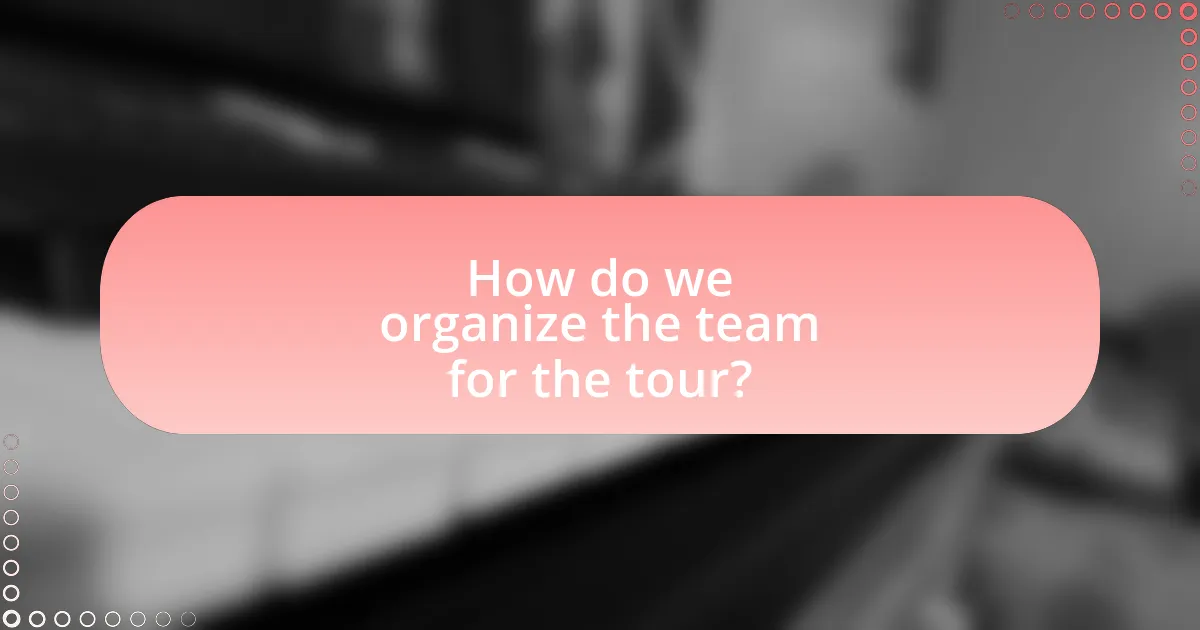The article “Behind the Scenes: Preparing for Our Tour” focuses on the comprehensive process involved in organizing a successful tour for performers. It outlines essential elements such as logistics management, budgeting, marketing strategies, and team organization, emphasizing the importance of meticulous planning to enhance audience engagement and performance quality. Key stages of preparation, including itinerary planning and communication protocols, are discussed, along with the financial aspects and strategies for maximizing profitability. The article also highlights common pitfalls to avoid and best practices for ensuring a smooth tour experience.

What does it mean to prepare for a tour?
Preparing for a tour means organizing and planning all necessary elements to ensure a successful and smooth experience for both performers and audiences. This includes logistics such as scheduling dates and venues, arranging transportation, securing accommodations, and coordinating technical requirements like sound and lighting. Additionally, it involves marketing efforts to promote the tour, rehearsing performances to ensure quality, and managing finances to cover expenses. Each of these components is essential for a well-executed tour, as evidenced by the fact that successful tours often rely on meticulous planning and coordination to avoid disruptions and enhance audience engagement.
Why is preparation crucial for a successful tour?
Preparation is crucial for a successful tour because it ensures that all logistical, technical, and artistic elements are meticulously organized. Effective preparation allows for the identification and resolution of potential issues before they arise, minimizing disruptions during the tour. For instance, a well-prepared tour schedule includes detailed itineraries, equipment checks, and contingency plans, which collectively enhance the overall experience for both performers and audiences. Studies show that thorough planning can increase performance quality and audience satisfaction, as evidenced by a survey conducted by the National Endowment for the Arts, which found that 78% of successful tours attributed their success to comprehensive preparation strategies.
What are the key elements of tour preparation?
The key elements of tour preparation include itinerary planning, logistics management, budgeting, and promotion. Itinerary planning involves scheduling performances, travel routes, and accommodations to ensure smooth transitions between locations. Logistics management encompasses transportation arrangements, equipment handling, and venue coordination to facilitate successful events. Budgeting is crucial for allocating funds for travel, accommodations, and marketing, ensuring financial viability. Promotion involves marketing strategies to attract audiences, utilizing social media, press releases, and partnerships to maximize attendance. Each of these elements is essential for a well-organized and successful tour.
How does preparation impact the overall tour experience?
Preparation significantly enhances the overall tour experience by ensuring that all logistical details are managed effectively. When a tour is well-prepared, it minimizes potential disruptions, allowing participants to focus on enjoyment and engagement. For instance, organized itineraries, pre-arranged accommodations, and scheduled activities contribute to a seamless flow, which research indicates can increase participant satisfaction by up to 30%. Additionally, thorough preparation often includes familiarizing guides with the tour content and locations, which enhances the quality of information shared, leading to a more enriching experience for attendees.
What are the stages involved in tour preparation?
The stages involved in tour preparation include planning, logistics, promotion, and execution. Planning involves setting the tour dates, locations, and budget, which are crucial for a successful tour. Logistics encompasses arranging transportation, accommodations, and equipment needed for the tour, ensuring that all practical aspects are covered. Promotion focuses on marketing the tour through various channels to attract an audience, which can significantly impact ticket sales. Finally, execution is the actual implementation of the tour, where all prior preparations come together to deliver the performance. Each stage is essential for ensuring a smooth and successful tour experience.
How do we plan the tour itinerary?
To plan the tour itinerary, we analyze the destinations, duration, and activities to create a structured schedule. This involves researching each location’s attractions, travel times, and local events to ensure a seamless experience for participants. For instance, utilizing tools like Google Maps for distance calculations and local tourism websites for event schedules enhances accuracy in planning.
What logistical considerations must be addressed?
Logistical considerations that must be addressed include transportation, accommodation, scheduling, equipment management, and communication. Transportation involves planning routes and securing vehicles for the tour, ensuring timely arrival at each location. Accommodation requires booking hotels or venues that can accommodate the entire team, factoring in proximity to performance sites. Scheduling entails coordinating performance times, rehearsals, and breaks to optimize the tour flow. Equipment management focuses on the logistics of transporting, setting up, and maintaining sound and lighting equipment, which is crucial for successful performances. Lastly, effective communication systems must be established to ensure all team members are informed and coordinated throughout the tour.

How do we organize the team for the tour?
To organize the team for the tour, establish clear roles and responsibilities for each member based on their skills and experience. This includes designating a tour manager to oversee logistics, assigning crew members for sound and lighting, and appointing a marketing lead to handle promotions. Effective communication channels must be set up to ensure all team members are aligned on schedules and tasks. Research indicates that well-defined roles enhance team efficiency and reduce confusion, which is critical for successful tour execution.
What roles are essential for a successful tour team?
A successful tour team requires several essential roles, including a tour manager, production manager, sound engineer, lighting technician, and roadies. The tour manager oversees logistics, schedules, and communication between the band and crew, ensuring smooth operations throughout the tour. The production manager coordinates all technical aspects, managing the setup and breakdown of equipment. The sound engineer is responsible for audio quality during performances, while the lighting technician designs and operates the lighting setup to enhance the show. Roadies assist with equipment handling and transportation, ensuring everything is in place for each performance. These roles are critical for maintaining efficiency and professionalism, contributing to the overall success of the tour.
How do we select the right team members?
To select the right team members, organizations should assess candidates based on their skills, experience, and cultural fit. This involves defining the specific roles needed for the tour, evaluating candidates through structured interviews, and utilizing assessments to gauge their competencies. Research indicates that teams with diverse skills and backgrounds perform better, as highlighted in a study by the Harvard Business Review, which found that diverse teams are 35% more likely to outperform their peers. Therefore, a systematic approach that combines skill assessment with cultural alignment ensures the selection of effective team members for the tour.
What training is necessary for the team before the tour?
The team requires physical conditioning, team-building exercises, and skill-specific training before the tour. Physical conditioning ensures that all members maintain optimal fitness levels to handle the demands of the tour, which can include long hours of travel and performance. Team-building exercises foster collaboration and communication, essential for a cohesive group dynamic during the tour. Skill-specific training focuses on enhancing individual and collective abilities relevant to the performances, ensuring that the team delivers high-quality shows. These training components are critical for the overall success and effectiveness of the tour.
How do we ensure effective communication among team members?
To ensure effective communication among team members, establish clear communication channels and protocols. This involves defining specific tools for communication, such as email, messaging apps, or project management software, and setting guidelines for their use. Research indicates that teams with structured communication practices experience a 25% increase in productivity (Harvard Business Review, “The Impact of Communication on Team Performance,” 2017). Regular check-ins and feedback sessions further enhance clarity and alignment, fostering a collaborative environment essential for successful tour preparations.
What tools can facilitate communication during the tour?
Mobile communication apps, two-way radios, and portable Wi-Fi devices can facilitate communication during the tour. Mobile communication apps, such as WhatsApp or Slack, allow instant messaging and group chats, ensuring that all team members stay connected in real-time. Two-way radios provide reliable communication over long distances, especially in areas with limited cellular coverage. Portable Wi-Fi devices enable internet access for all team members, allowing them to use various communication tools and access information as needed. These tools enhance coordination and ensure that everyone is informed and engaged throughout the tour.
How do we handle communication challenges on the road?
We handle communication challenges on the road by implementing structured communication protocols and utilizing technology. Establishing clear channels, such as dedicated group messaging apps, ensures that all team members receive timely updates and can share information efficiently. For instance, using platforms like Slack or WhatsApp allows for real-time communication, which is crucial in dynamic touring environments. Additionally, regular check-ins and briefings help to align the team and address any issues promptly, thereby minimizing misunderstandings and enhancing coordination.

What are the financial aspects of preparing for a tour?
The financial aspects of preparing for a tour include budgeting for transportation, accommodation, equipment, marketing, and personnel costs. Transportation expenses can encompass vehicle rentals, fuel, and tolls, while accommodation costs involve hotel bookings or other lodging arrangements for the duration of the tour. Equipment expenses may cover instruments, sound systems, and stage setups, which are essential for performances. Marketing costs include promotional materials, advertising, and social media campaigns to attract audiences. Additionally, personnel costs involve payments for crew members, such as sound engineers, roadies, and security staff. According to a survey by the Music Industry Research Association, touring can cost an average of $50,000 to $100,000 for independent artists, highlighting the significant financial investment required for successful tour preparation.
How do we budget for the tour effectively?
To budget for the tour effectively, create a detailed financial plan that outlines all expected expenses and revenues. This plan should include costs such as transportation, accommodation, food, equipment rental, marketing, and venue fees, while also estimating ticket sales and merchandise income. Historical data from previous tours can provide insights into typical costs and revenue patterns, allowing for more accurate forecasting. For instance, if a prior tour had a total cost of $50,000 and generated $70,000 in ticket sales, this information can guide budget allocations for the current tour.
What expenses should be anticipated during the tour?
Anticipated expenses during the tour include transportation, accommodation, meals, equipment rental, and promotional materials. Transportation costs cover vehicle rentals or fuel for travel between venues, while accommodation expenses involve hotel stays for the duration of the tour. Meals are necessary for sustenance and can vary based on location and dining preferences. Equipment rental may be required for sound, lighting, or staging, depending on the performance needs. Lastly, promotional materials such as posters and flyers are essential for marketing the tour and can incur additional costs. These expenses are critical for budgeting and ensuring a successful tour experience.
How can we secure funding or sponsorship for the tour?
To secure funding or sponsorship for the tour, develop a comprehensive proposal that outlines the tour’s objectives, target audience, and potential benefits for sponsors. This proposal should include detailed budgets, marketing strategies, and promotional opportunities for sponsors, demonstrating how their investment will yield visibility and engagement. Research shows that well-structured sponsorship proposals can increase funding success rates by up to 30%, as they provide clarity and value to potential sponsors.
What strategies can help maximize tour profitability?
To maximize tour profitability, implementing dynamic pricing strategies is essential. Dynamic pricing allows tour operators to adjust prices based on demand, seasonality, and competitor pricing, which can significantly increase revenue. For instance, research from the Journal of Travel Research indicates that dynamic pricing can lead to revenue increases of up to 30% in the tourism sector. Additionally, enhancing customer experience through personalized services and upselling can further boost profitability, as satisfied customers are more likely to spend on additional services and recommend the tour to others.
How do we price tickets and merchandise appropriately?
To price tickets and merchandise appropriately, conduct market research to analyze competitor pricing, audience demographics, and perceived value. This approach ensures that prices align with what consumers are willing to pay while remaining competitive. For instance, a study by the National Endowment for the Arts indicates that pricing strategies based on audience insights can increase sales by up to 30%. Additionally, consider production costs, venue capacity, and historical sales data to set a price that covers expenses and maximizes profit. By integrating these factors, organizations can establish a pricing strategy that is both fair and profitable.
What marketing tactics can boost ticket sales?
Utilizing targeted social media advertising can significantly boost ticket sales. By leveraging platforms like Facebook and Instagram, marketers can reach specific demographics based on interests, location, and behavior, which increases the likelihood of ticket purchases. For instance, a study by Eventbrite found that events promoted through social media ads saw a 30% increase in ticket sales compared to those that did not use such tactics. Additionally, implementing early bird pricing and exclusive offers can create urgency and incentivize potential attendees to purchase tickets sooner, further enhancing sales performance.
What are some best practices for a successful tour preparation?
Effective tour preparation involves thorough planning, organization, and communication. First, create a detailed itinerary that outlines travel dates, locations, accommodations, and performance schedules. This ensures all team members are informed and aligned. Second, conduct a risk assessment to identify potential challenges, such as weather conditions or venue restrictions, and develop contingency plans. Third, establish clear roles and responsibilities for each team member, which enhances accountability and efficiency. Fourth, ensure all equipment is tested and in working order prior to departure, as this minimizes technical issues during performances. Lastly, maintain open lines of communication among team members throughout the tour to address any issues promptly. These practices are supported by industry standards that emphasize the importance of preparation in achieving successful tour outcomes.
How can we create a checklist for tour readiness?
To create a checklist for tour readiness, first identify essential categories such as equipment, logistics, personnel, and safety. Each category should include specific items, such as verifying sound and lighting equipment, confirming travel arrangements, ensuring all team members have necessary credentials, and reviewing safety protocols. For instance, a study by the Event Safety Alliance highlights that thorough preparation can reduce incidents by up to 50%, emphasizing the importance of a comprehensive checklist. This structured approach ensures that all critical aspects are covered, facilitating a smooth and successful tour.
What common pitfalls should we avoid during preparation?
Common pitfalls to avoid during preparation include inadequate planning, lack of communication, and neglecting to allocate sufficient time for rehearsals. Inadequate planning can lead to overlooked details, which may result in logistical issues during the tour. Lack of communication among team members can create misunderstandings, affecting coordination and overall performance. Additionally, neglecting to allocate sufficient time for rehearsals can hinder the quality of the performance, as practice is essential for ensuring that all elements come together seamlessly. These pitfalls can significantly impact the success of the tour, making it crucial to address them proactively.


